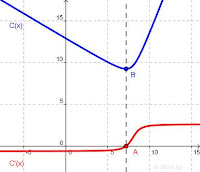Example:
Suppose the path to construct a refinery pipeline comes to a
perfectly straight and uniform river at some point, with the refinery
across the river, some distance upstream.
Suppose the river is 1 unit wide, and the refinery is 8 units
upstream. Also suppose the relative cost (per unit distance) for
constructing the pipeline in/over/under water is 1.6 that of
constructing it over land.
First, define in terms of distance:
Let
P = point pipeline reaches river
Q = point on opposite bank directly across river from P
R = location of refinery
S = some point on the opposite bank between Q and R
x = distance from S to R
see
crossing the river (path)
Given
PQ is 1 unit
QR is 8 unit
then
QS = 8 - x
and
Using pythagorean distance formula:
PS = √(1² + (8 - x)²)
PS = √(x² - 16x + 65)
domain 0 ≤ x ≤ 8
Second, define in terms of cost:
relative cost on land = 1
relative cost in water = 1.6
Let
C(x) = total relative cost of pipe
C(x) = x + 1.6√(x² - 16x + 65)
Third, solve:
C(x) is minimized when C'(x) = 0, soThird, solve:
C'(x) = 0.8(2x - 16) / √(x² - 16x + 65) + 1
0 = 0.8(2x - 16) / √(x² - 16x + 65) + 1
⋮
yadda yadda
⋮
1.56x² - 24.96x + 98.84 = 0
Apply quadratic formula to find:
x ≈ 7.1994 (discard spurious root out of domain)
So
The pipeline crosses river to a point ≈ 7.2 km from refinery.



No comments:
Post a Comment